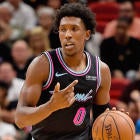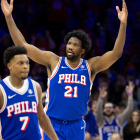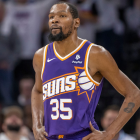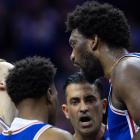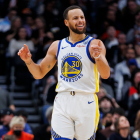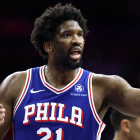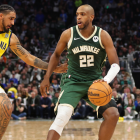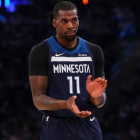NEW YORK -- As Josh Richardson walked onto the court at Barclays Center on Wednesday, Miami Heat assistant coach Chris Quinn gave him a two-word message: "Be aggressive." Richardson, the 25-year-old wing who played himself out of Jimmy Butler trade talks with a phenomenal start to his fourth season, still needs that reminder. He had a 13.3 usage rate as a rookie drafted No. 40 overall; since then, he has gradually grown out of his complementary role.
Richardson doesn't have to take 30 shots every night, Heat coach Erik Spoelstra said, "but he can't just play off of others for our offense to reach its full potential." You might think that every player is desperate for as many touches and shots as he can handle, as scoring means attention and status and stardom. For Richardson, however, this increased responsibility has forced him out of his comfort zone. That's why Quinn says those two words to him every time he takes the floor.
Early results have been more than encouraging: Richardson has averaged a team-high 20.1 points without sacrificing any efficiency -- his true shooting percentage is 55.6 percent, thanks largely to his 42.6 percent mark from deep on a career-high 6.7 3-point attempts per game. His teammates have seen flashes of this for years, but now they see him producing consistently and being vocal.
"Man, it's been fun, it's been fun," Miami guard Wayne Ellington said. "I always knew he had that potential, but to see him put the work in to get to where he's at is inspiring. He's definitely evolving into the player that he's capable of being."
A couple of weeks ago in Detroit, Richardson took over. He scored nine of Miami's 15 points in overtime, and, after the 120-115 win, Dwyane Wade told reporters that the team needs Richardson to continue playing with that level of confidence. It is easy to find examples of him doing that: In the first quarter against the Brooklyn Nets, he grabbed a rebound, pushed the ball down the floor and used half the shot clock to manufacture two points with a tough hook shot over Spencer Dinwiddie's outstretched arm.
After shootaround in Brooklyn, Richardson told CBS Sports that his biggest improvement is not skill-related, but rather his mindset and how he approaches his job. He came into the season thinking differently.
This conversation has been condensed and edited for clarity and flow.
CBS Sports: How is your mindset different this year?
Josh Richardson: Just more aggressive and decisive. In the past, I always played very passive on offense. This year I'm just trying to make it a point to make teams guard me and make it hard on 'em, so myself and my teammates can get better looks.
CBS: You came into the league as a second-round pick, there were established vets on the team, people weren't sure if you're going to stick. What do you remember about the early stages of your career?
J.R.: It was cool. It made it a lot easier coming in with Justise Winslow. That was my boy. I kind of lived vicariously through him at first. It was fun to be able to feel like I was doing something. But, I mean, the coaches just kind of told me I just had to stay in the gym and work at it and I probably wasn't going to play much. So that's what I did.
CBS: It was really only after the All-Star break that the DNPs stopped. At that point, what were you doing to make sure you got to stay on the floor?
J.R.: Play as hard as I could. And I told myself that, when I got to play, if ever, that if I got open looks, I was just going to take them. I wasn't going to go out there and play scared. That was probably my biggest thing, I think, being a rookie coming in and being aggressive and being an impactful player was probably the biggest thing.
CBS: The label "3-and-D" guy quickly got attached to you. I think it was meant as a compliment, but can that also be limiting?
J.R.: Yeah, I think the term is kind of -- I think it kind of tried to box me in a little bit. Just because that was my role for a while, so I played my role and I did it to the best of my ability. But if you watched my highlights before the NBA, I did a lot more stuff. And now I think I'm showing that I can do a lot more than just 3-and-D, too. I try not to limit myself to one category. I think it's working out well.
CBS: How did you go about earning more responsibility on offense little by little every season?
J.R.: I think it just kind of happened organically. I think it's a product of the work that I put in every summer and every season. I remember last year, when guys would go down, I'd just try to step my game up a little bit more, and I think the coaches and everybody saw that and saw what I was capable of from there.
CBS: I talked to Udonis before the season and he said the Heat were bringing back the same names on the roster, but not the same team because guys like you got so much better. Do you feel like a different player than you were in April?
J.R.: Yeah, definitely. Yeah. I mean, I don't feel like I'm a different player skill-wise; it's just mindset. I think everything in this league is confidence and mindset. I've worked on mine this summer, and that's probably my biggest development.
CBS: With proven guys like Goran and Dwyane on the team, do you think people understand what kind of transition it is to get comfortable taking 20 shots in a game or sort of taking over late in a game like you did against the Pistons?
J.R.: No, no, no, no. I don't think people understand at all how different, how uncomfortable, how tough that is to step into that. Especially for somebody like myself, who has always been laid-back, passive, just cool, like, whatever the team needs. It's a constant process for me right now, trying to stay locked into that mindset. My last game [a 124-114 loss against Philadelphia], I only shot eight times. It was just one of those games where I forgot to remind myself to be aggressive. The team needs me to be aggressive. It's just a constant battle, kind of, staying in my own head.
CBS: Does Spo come talk to you after a game like that? Do teammates do it?
J.R.: Nothing really happened after. I just looked at the score and, yeah, I saw I only shot eight times. I was like, man. I don't really care about shots, I'm not a guy that cries about shots, I just care about wins. But I think that, if our team is going to be successful, I have to be aggressive for my teammates.
CBS: You always took pull-up jumpers. When you're told, "Hey, I want you to replace those with pull-up 3s," is that a natural transition to make or is it a drastic change?
J.R.: It's just stepping back a couple feet. I definitely worked on it a lot this summer. Coach Spo told me that midrange shots aren't the best shot I can get, and he was just like, "Just step back a couple feet and shoot a 3 if you want to do that." So, I worked on it this summer and, yeah, I'm starting to shoot it a lot more in the games.
CBS: What has Chris Quinn meant to your career?
J.R.: Man. Like, everything. He's, like, my guy. He's my workout guy. I know his kids. I know his family. Like, I go to dinner over there. He came to California when I was training this summer. He brought his son with him. We all hung out. They came to the gym really early in the morning and in the afternoon. He's always been a big voice in my ear about trying to get better every day, about being aggressive. He tells me every game. Before every game, when I walk to the floor, he's saying, "Be aggressive." My development is mostly because of him. Every off-day, every practice day, he's always texting me, I'm always texting him to work out. I'm grateful for him because everybody don't have a relationship with one of their coaches or trainers like that.
CBS: You surprised I didn't ask about trade rumors?
J.R.: Yeah, I am actually. It's pretty much every one of them has been like -- they're always like, are you relieved? Like, man, I don't care. It is what it is.













